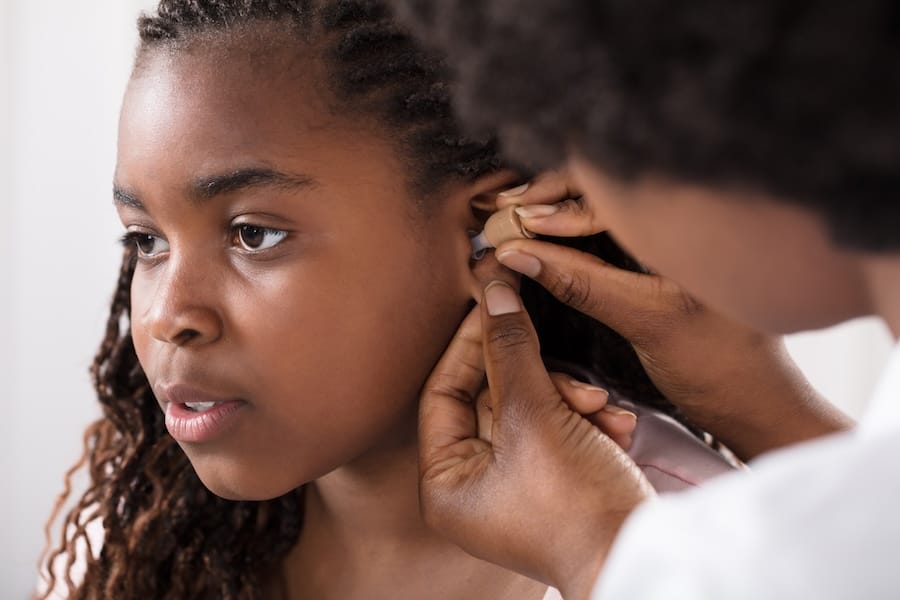Hearing loss is a widespread issue, affecting millions of people worldwide. Individuals with hearing loss often delay treatment for various reasons, including cost, social stigma, inaccessibility, and lack of education regarding consequences of untreated hearing loss. Over-the-counter (OTC) hearing aids have been designed and offered as an alternative treatment in an attempt to eliminate at least some of the barriers that prevent individuals from seeking help for their hearing loss, but many are still confused and overwhelmed when trying to manage hearing loss on their own.
The reality is that hearing loss cannot simply be resolved by placing a hearing aid in the ear. It is a complicated medical condition that may be caused by several factors and can impact not only the ears themselves, but also the auditory nerve and brain function. Even individuals with identical hearing losses on paper can have vastly different outcomes with hearing aids and aural rehabilitation. Because of this, audiologists are a valuable resource for diagnostics, hearing aid fittings, and patient education, even in the OTC hearing aid space.
The Role of an Audiologist
Audiologists are trained in the diagnosis and treatment of hearing loss. Most will start with diagnostic testing to determine the type and degree of hearing loss. This testing will also determine if there are any possible medical factors contributing to hearing loss that need to be investigated further, and referrals will be made if needed. If amplification is deemed appropriate, the audiologist will discuss options based on many factors, including hearing loss, individual preferences, lifestyle, price point, and goals. After a device is selected, the audiologist will ensure proper fit and programming of the hearing aids before moving on to further counseling.
It is important to understand that hearing loss is complicated. Most people with hearing loss also have some degree of nerve damage in the inner ear and possibly a loss of speech processing ability, which essentially means that the brain is only getting pieces of a message. Amplification provides more pieces to work with, but processing this information and putting those pieces together will take time and practice. In addition, listening with a hearing aid is not the same as listening with natural hearing. Individuals will need to learn to hear sound that is being processed through a microphone and speaker.
This includes not only speech sounds, but also environmental noises that their brain no longer recognizes because it has not had access to these sounds in a long time. It can take several months to fully adjust to a hearing aid, and it may never be a perfect solution, depending on the damage to the auditory system. An audiologist can help navigate this adjustment period, set realistic expectations and goals, adjust programming as needed, and provide follow-up support in order to achieve the best possible outcomes with hearing aids.
How Does an Audiologist Fit in the OTC Space?
FDA-regulated OTC hearing aids became available to the public in 2022 to improve affordability and accessibility of hearing aids for adults with self-perceived mild to moderate hearing loss. The research for these devices is still in early stages, but is very promising so far when comparing them to traditional prescription hearing aids. Although it is not a requirement to work with an audiologist to obtain and fit OTC products, it is still highly recommended.
There are a few reasons for this. The first is that distinguishing personal sound amplification products (PSAPs), designed to enhance normal hearing in specific listening situations, from true FDA-regulated OTC hearing aids is difficult for many consumers, as marketing for PSAPs is often vague and misleading. Also, individuals who purchase OTC hearing aids from companies that do not offer support services from an audiologist may struggle with programming, maintenance, and adapting to their new devices without professional assistance. Finally, not every individual is a good candidate for OTC hearing aids. Those with severe hearing loss, medically complex hearing losses, and other “red flag” conditions outlined by the FDA should not be using OTC hearing aids. An audiologist may also make recommendations for or against OTC hearing aids based on other factors, like lifestyle, goals, dexterity, and comfort with technology.
As OTC hearing aids become more popular, audiologists will play a role in research, regulations, development of technology, patient support and education, device programming and troubleshooting, as well as guiding OTC providers to uphold quality care and service to consumers comparable to that which they would receive in a clinical space.
Conclusion
In conclusion, audiologists are a valuable resource for anyone choosing to pursue treatment for their hearing loss, regardless of the treatment path and devices they choose. Audiologists can provide information about hearing loss and appropriate amplification, assist with programming devices to fit individual needs based on goals and lifestyle, and follow up with counseling and technology support to help achieve the best possible outcomes when managing hearing loss. By combining clinical expertise and personalized care, audiologists are helping individuals take meaningful steps toward better hearing health and improved quality of life.
Image Source: ID 103314220 | Audiologist ©
Andrey Popov | Dreamstime.com

Heather Andrews
Heather Andrews, Au.D., CCC-A, earned her Doctorate in Audiology from East Tennessee State University in 2016. She specializes in hearing aids and telehealth audiology, with extensive experience treating patients of all ages for hearing and balance issues. Dr. Andrews is committed to making quality audiological care accessible to all, leveraging the latest technology to improve patient outcomes. She focuses on providing personalized care, patient education, and practical solutions to empower individuals in their hearing health decisions. Through her expertise and dedication, Dr. Andrews helps patients enhance their hearing capabilities and engage more fully with their environment.







